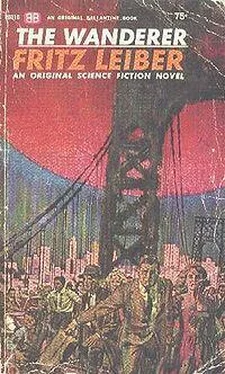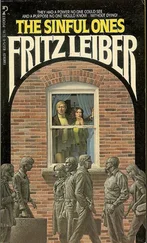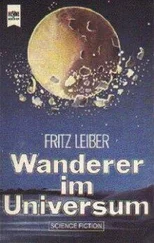The motor caught. Wojtowicz swung Wanda behind him, and he and Paul pushed at the tailgate, sprawling on the boards when the truck lurched forward a foot or so. Its rear tires squealed as they spun in the wet sand. A heave from the men below, another forward lurch, a hesitation, another running heave, and suddenly the truck was going away fast, its tailgate swinging, its tail lights shining on the foam-frosted water nipping at its heels.
The second wave was high enough to overrun a corner of the platform and rock it a little, the cracks spouting like a sprinkler system. As it receded, Paul hustled Margo across the slippery boards. She was clutching Miaow. He paused on the back edge of the platform and looked around at the others and at the men struggling to their feet below in the shallow water.
“Come on! Quick, before the third one hits!” he yelled and plunged off with Margo, leading the rush after the truck.
Arab and Pepe and High expected blue floods of police to pour down after them into the Lenox and 125th Street subway station. So they hid in the can, Arab ready to shred their remaining reefers into the toilet and High set to flush it, while Pepe listened at the door. It wasn’t very smart but it was done almost instinctively.
But nobody else tried to come in; they didn’t hear police tramping and shouting around, in fact they didn’t hear anything. Presently they came out.
The empty station was like a haunted house, so for a while they just snuck around. Pepe tried to get some chocolate out of a machine but it stuck. He biffed it once but stopped at the noise. They got on the back end of the empty, waiting train, which was headed downtown, and walked through it all the way to the front. There Arab fingered a lever for a while and then swung it. The doors started to close and he swung it back quick. He moved another lever and the purring got louder, and the train seemed to strain, and he quickly reversed that one, too.
“Better not mess with those,” he said with a giggle.
They studied the black double tunnel through the front door, waiting for a train to come the other way, but none did.
The longer the station stayed empty, the more it felt like a private world of their own. Feeling world-owner wealthy, they lit three sticks and sipped them on the engineer’s platform.
Finally Arab said: “What we think really happen, High?”
High frowned hard. Then, “Russians land at the Battery from supersubs. Defeat the fuzz at the Battle of Union Square. Fuzz retreat north, fighting a rear-guard action. Russians advance. My orders of the day: lurk below, men, and play deaf and dumb.”
Arab nodded. “Pepe?”
“That fireball! She surface at the Battery and split up without blasting, and then come flowing uptown through the streets. People think she poison gas and go for the roofs, but she really happy smoke, poppy-weed mix. Everybody but us strangle to death. Too scare’ to inhale. Arab?”
A warm breeze began to flow past them from the tunnel ahead. It was heavy with subway smell: metal, dry dirt, human stateness, a dash of electricity.
“Come on, Arab, you started this,” Pepe prodded him.
“O.K., I got it now,” Arab said. “River high, we saw. Keep getting higher. Water surface at the Battery, drive ashore and come north. Flood like Noah’s! Tell people to take to the roofs and turn to pillars of salt. Clear out the basements and the subways. Fuzz run. Firemen all set with hoses, but water one thing they can’t fight. They run too. Water just a-coming and a-coming.”
“Hey, that’s good,” High said. “Ree-alistic.”
The breeze got stronger and so did the subway smell, but now an inappropriate odor was mixed with the latter.
Far down the tunnel there was a blue flash.
“Train coming,” Pepe said.
There was another blue flash, and another. The breeze became a wind, and now the inappropriate odor came clear: it was the smell you got near the river. And there was a roaring growing louder.
“Dark train coming on both tracks!” Arab screeched.
The blue flashes came closer, closer, became brighter, brighter. The salty, sour wind was a gale; papers and dust were flying; the roaring was that of a thousand lions.
For a moment, clutching each other on the platform, they saw it clear: the foamy front dark with dirt and footed with blue flame.
Then the electricity-loaded piston of salt water struck.
Sally Harris and Jake Lesher nibbled scrambled eggs and caviar from a silver platter set over a blue flame and a crystal bowl set in ice.
“Gee, we’re high up,” Sally said, gazing out across the penthouse patio. “All I can see is the Empire State, RCA, the Chrysler, the Sixty Wall Tower…and is that bitty point the Waldorf Astoria?”
“Forty stories before we switched to Hasseltine’s private elevator,” Jake told her as he spooned caviar onto a toasted split bagel. “I counted.”
Sally took her coffee cup to the tubular chrome balustrade and peered over with a reckless swoop. “Whee, people look like gumdrops,” she called back to him. “They’re running — I don’t know why. Jake, once I asked you what those little hydrants are for that they have sticking out of buildings — I thought they were for putting out fires in cars, remember, or holding back mobs of rioting garment workers.”
“Naw, they’re for washing down the sidewalks in the morning,” Jake instructed her, pouring himself a cup of coffee from the tall slim pot with the red light at its base.
She nodded. “I thought so — they’re using them now.”
“Naw, they do it at four a.m. Now it’s eight.” His eyes grew distant. It felt to him as if the money-thought he’d had in Times Square were at last coming back.
“Well, maybe, but it looks awfully wet.” She studied a while longer. Then, “Jake?”
“What now? Sal, I’m trying to think.”
“You’re right. The water’s not coming out of those little hydrants. It’s coming out of the subways.”
Jake jumped up and came down with a heel-slam that jolted him painfully. The floor had jumped, too. The building roared and lurched — and lurched again. He flailed the air with his arms and grabbed the chrome balustrade where Sally was rocking and squealing above the roar. Blocks down, her coffee cup and large flakes of stone made pin-point flat splashes.
The lurching and roaring faded. Sally leaned over and pointed straight below at a black ribbon coming out of their building near the base.
“Look!” she yelled. “Smoke! Oh’ Jake, isn’t it exciting?” she demanded as he dragged her back. “We ought to make a play out of it!”
In the chaos of the moment, Jake still was able to realize that this was the money-idea for which he had been groping.
Behind them the telltale red light at the base of the coffee pot went out, and the orange glow of the toaster faded.
The saucer students had outrun three more sloshing earthquake waves that were more spume than water — calf-deep fakes — and had actually reached dry sand and halted there, most of them winded, the Ramrod and Ida half dragging his other woman between them, when the really big combers started chasing them all.
Up ahead, the rounded foothills of the Santa Monica mountains loomed dark and heavy against a sky that had begun to gray with the dawn. Nearer, but already quite far, the bobbing lights of the truck continued to recede. Hixon had taken the most direct course away from the sea, a course midway between the great hump of Vandenberg and the crumbled lower palisades that had buried the cars, and the others had followed the truck. This had been wise — any other course would have had them running slantwise to the waves across even lower beach; the trouble was that even the midway course was nothing but sand and flat sandy ground for a long distance — a dry river wash.
Читать дальше










